Chinese Way
New beats for old art
Updated: 2011-08-12 08:18
By Chen Nan (China Daily)
|
Er Ge's performances, which combine traditional Chinese art forms and rock beats, are accompanied by his band Nan Cheng Er Ge. Wang Jing / China Daily |

One of the nation's most original rock bands is packing in the crowds by reinventing a dying folk tradition of narrative singing. Chen Nan reports.
While traditionalists frequently lament the threat to ancient Chinese art forms, local rock heroes are spearheading their own reinvention of these arts.
Nan Cheng Er Ge, considered one of the nation's most original rock bands, is sparking a surge in popularity of the age-old art of quyi.
Quyi is a general term for performing arts that involves speaking, chanting and singing. It includes dagu and pingshu (story-telling), and xiangsheng (crosstalk).
The Lao She Teahouse in the capital's Qianmen area is where much of this revival is happening.
At a recent show, two young men dressed in traditional long robes engage in a dialogue. One of them asks: "Welcome to our newly-opened restaurant. Are you ready to order?"
The other answers: "Serve me all of your best dishes, I want to try them first."
Just as the audience expects this conversation to develop into a crosstalk show, Er Ge, founder and lead vocalist of the band, also in a long robe, comes on stage followed by two young women.
Placing a drum in front and holding a pair of bamboo clappers in his hands, he starts singing jingyun dagu, a musical narrative delivered in the Beijing dialect that dates back to the late Qing Dynasty (1644-1911).
Even as the audience tries to get to grips with what's going on, the first two young men pick up an electric bass and a guitar, and the two young women reach for an erhu and sanxian (traditional two- and three-string instruments).
Bass riffs and guitar sounds mix with the clean sounds from the Chinese instruments, as they sing, joke and spoof current events.
Their song, Face, one of the band's most popular, is followed by others that combine traditional Chinese instruments and art forms, to rock beats.
"China may not be the birthplace of rock 'n' roll but we are revitalizing rock by linking this Western music genre with our own culture," says Er Ge, 38.
The band has been drawing enthusiastic crowds at live music venues across the capital and various music festivals since 2007.
"I was so worried when we performed in our early days. The band was experimenting and no one knew what the audience feedback was going to be," Er Ge says.
Their first performance at Haoyun Bar in Beijing in the winter of 2007 drew a crowd of nearly 500. In 2009, when they performed at the Strawberry Music Festival's main stage, more than 10,000 people attended.
"Although our musical style is new, the topics we choose reflect what the common people are thinking," Er Ge says. "The combination of modern rock rhythms and Chinese quyi is a fresh experience for audiences. Rock 'n' roll, we feel, is not about roaring angrily. We have reinvented the genre by combining it with quyi."
The former music producer prefers to be called Er Ge, or second elder brother, as it makes him feel closer to his audiences and the grassroots spirit of his music. Nan Cheng refers to the south part of the capital, which is home to many time-honored brands and traditional art masters. Places like Tianqiao and Qianmen, dubbed "old Beijing", is where many folk artists, from acrobats to quyi performers, lived and performed.
Er Ge, who is from Tianjin, performed in Beijing's Nan Cheng for more than 20 years and is deeply influenced by the spirit of the arts there. He says he has produced music for TV series, national galas and rock bands, but it is quyi, which he studied in his spare time, that he is most attracted to.
"I was born in Tianjin, where quyi is an important part of the culture. I have listened to xiangsheng and dagu since I was a kid. But quyi has been forgotten by audiences. I wanted to do something for this ancient art form, so I started Nan Cheng Er Ge," he says.
He found the other four members through open auditions and trained them on every aspect of quyi - the singing, talking, acting, instrument playing and stand-up comedy.
Shi Liang, the bassist from Shanxi province, joined the band in 2008. The 29-year-old was a diehard fan of rock and heavy metal. When he went to the audition, he knew nothing about Nan Cheng Er Ge but had once watched its founder perform.
"I liked his style, it was very fast and also strange," Shi recalls. "Like most young people, I am not interested in quyi. In my mind, it belongs to my grandmother's generation. But the more I learned about it, the deeper I understood it and the more I began to love it," Shi says.
"The younger performers are very creative and imaginative. They focus more on modern stories," Er Ge says. He is confident they will keep quyi alive.
Nan Cheng Er Ge is now ready to move into theaters.
They will present their new show, Kua Zhu Zhai, or Praising Houses, which is adapted from traditional Chinese crosstalk. This piece has been performed by many xiangsheng artists, such as Ma Sanli and Guo Degang. Er Ge says that it will be now get the rock treatment.
It will be held at the capital's Nine Theater and Dizhi Theater for a month and Er Ge promises each show will be different, with impromptu performances.

Specials

Star journalist leaves legacy
Li Xing, China Daily's assistant editor-in-chief and veteran columnist, died of a cerebral hemorrhage on Aug 7 in Washington DC, US.

Beer we go
Early numbers not so robust for Beijing's first international beer festival

Lifting the veil
Beijing's Palace Museum, also known as the Forbidden City, is steeped in history, dreams and tears, which are perfectly reflected in design.
